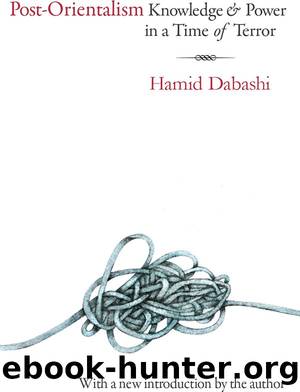Post-Orientalism: Knowledge and Power in a Time of Terror by Dabashi Hamid

Author:Dabashi, Hamid [Dabashi, Hamid]
Language: eng
Format: epub
Publisher: Taylor and Francis
Published: 2017-07-27T16:00:00+00:00
* * *
At one critical moment in âCan the Subaltern Speak?â Gayatri Spivak and Edward Said, rarely on the same page, come together when she catches the tiger of the European progressive politics by the toe and notes Michel Foucaultâs hurried conflation of language and discourse as he hastens to salvage his theory of power. The occasion of this concurrence between Spivak and Said is when she wants to insert the function of the public intellectual between âthe Subject of desire and power as an irreducible methodological presupposition,â on one hand, and âthe self-proximate, if not self-identical, subject of the oppressed,â on the other. 20 Spivakâs position is that âthe intellectuals, who are neither of these S/subjects, becomes transparent in the relay race, for they merely report on the nonrepresented subject and analyze (without analyzing) the working of (the unnamed Subject irreducibly presupposed by) power and desire.â 21 Here, Spivak resorts to a strategic alliance with Said and quotes him affirmatively for having wondered why Foucaultâs critique of power disregards âthe role of economics, the role of insurgency and rebellion.â 22 This is where Spivakâs alliance with Said becomes pronounced:
I add to Saidâs analysis the notion of the surreptitious subject of power and desire marked by the transparency of the intellectual. Curiously enough, Paul Bové faults Said for emphasizing the importance of the intellectual, whereas âFoucaultâs project essentially is a challenge to the leading role of both hegemonic and oppositional intellectuals.â I have suggested that this âchallengeâ is deceptive precisely because it ignores what Said emphasizesâthe criticâs institutional responsibility. 23
Spivak is much gentler here with Saidâs characteristic humanism than was James Clifford in his famous critique of Orientalism , where he exposed what he considered to be the central paradox of the text, namely its being âambivalently enmeshed in the totalizing habits of Western humanism.â 24 Spivakâs gentle defense of Said, taking on Bové for having ignored âwhat Said emphasizesâthe criticâs institutional responsibility,â is as close as she can get to Saidâs persistent and embattled humanism without compromising her own relentless critique of the European encounter with the sovereign subject. This is a particularly endearing moment in the mutual (but divergent) history of these two towering figures of our critical disposition: Saidâs defiant humanism and Spivakâs rebellious uprising against the European critique of the sovereign subject. This is the crucial occasion where the sovereignty in which Edward Said effectively partakes, and (here is the rub) which in effect âinaugurates a [European] Subject,â at the expense of silencing the (poor, colored, and female) subaltern, come together to aufgehoben into a third-level critique that embraces them both.
Here we are put in a very privileged position to see Spivakâs postcolonial critique of post-structuralism to the left of the European critique of the sovereign subject and Saidâs defiant insistence on (what he would later call âdemocratic) humanismâ to its right. Spivak wants to up the ante and put forward a far more radical critique of the European dismantling of the sovereign subject (by way
Download
This site does not store any files on its server. We only index and link to content provided by other sites. Please contact the content providers to delete copyright contents if any and email us, we'll remove relevant links or contents immediately.
| Anthropology | Archaeology |
| Philosophy | Politics & Government |
| Social Sciences | Sociology |
| Women's Studies |
The Leavers by Lisa Ko(6474)
Born to Run: by Christopher McDougall(6263)
iGen by Jean M. Twenge(4702)
Sapiens by Yuval Noah Harari(4538)
The Kite Runner by Khaled Hosseini(4438)
Spare by Prince Harry The Duke of Sussex(4199)
Bullshit Jobs by David Graeber(3180)
Livewired by David Eagleman(3123)
Goodbye Paradise(2964)
Never by Ken Follett(2884)
A Dictionary of Sociology by Unknown(2518)
Harry Potter 4 - Harry Potter and The Goblet of Fire by J.K.Rowling(2416)
The Club by A.L. Brooks(2362)
People of the Earth: An Introduction to World Prehistory by Dr. Brian Fagan & Nadia Durrani(2346)
The Social Psychology of Inequality by Unknown(2311)
Machine Learning at Scale with H2O by Gregory Keys | David Whiting(2293)
Harry Potter and the Order of the Phoenix (5) by J.K. Rowling(2227)
0041152001443424520 .pdf by Unknown(2220)
Don't Sleep, There Are Snakes by Daniel L. Everett(2217)
